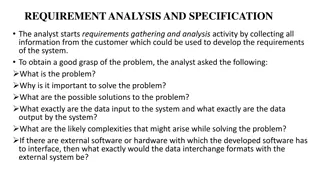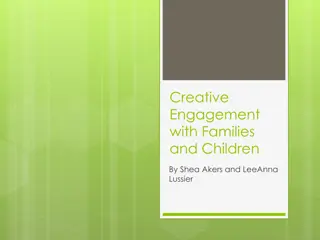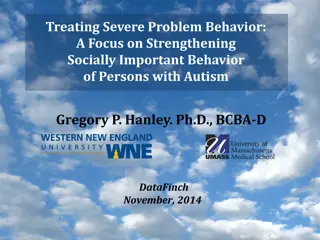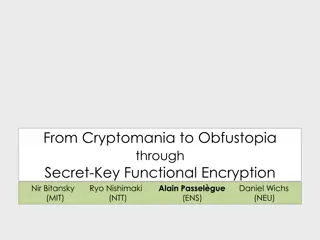Preventing Severe Problem Behavior Through Functional Skill Teaching
Focus on teaching functional skills to prevent the development or reemergence of severe problem behavior. All individuals, especially those with ASD, should be taught essential skills to enhance their social interactions and overall well-being. Identifying and setting up evocative situations plays a key role in this prevention model, leading to a significant reduction in problem behavior and a notable increase in target skills. The study highlights the importance of introducing evocative situations thoughtfully and systematically in educational and home settings.
Download Presentation

Please find below an Image/Link to download the presentation.
The content on the website is provided AS IS for your information and personal use only. It may not be sold, licensed, or shared on other websites without obtaining consent from the author.If you encounter any issues during the download, it is possible that the publisher has removed the file from their server.
You are allowed to download the files provided on this website for personal or commercial use, subject to the condition that they are used lawfully. All files are the property of their respective owners.
The content on the website is provided AS IS for your information and personal use only. It may not be sold, licensed, or shared on other websites without obtaining consent from the author.
E N D
Presentation Transcript
Preventing Severe Problem Behavior: A Focus on Strengthening Socially Important Behavior Gregory P. Hanley. Ph.D., BCBA-D DataFinch November, 2014
Why wait for severe problem behavior to develop? Teach functional skills to prevent problem behavior from developing or reemerging
Which skills? All skills taught following effective functional assessment should be taught to all children and all persons with ASD
Which skills? Prevent problem behavior by teaching generalized repertoires for: Producing automatic reinforcers (i.e., play and leisure skills) Complying with typical instructions Recruiting and maintaining others attention Escaping or avoiding unpleasant situations Gaining or maintaining preferred materials or contexts Tolerating delays and denials of these same events/contexts
Key Factor: Identifying and Setting up Evocative Situations Repeatedly introduce evocative situations and teach functionally equivalent skills Arrange low or divided attention-- teach requests for attention Arrange difficult or impossible tasks-- teach requests for assistance Arrange viewable but unattainable materials-- teach requests for materials Arrange delays and denials of same events-- teach tolerance
Study Summary and Implication Summary: 74% reduction of problem behavior 4-fold increase in target skills Teachers report high overall satisfaction with the teaching strategies and the size of the effects Take home point: Evocative situations should not be avoided in schools or homes; they should be introduced thoughtfully, systematically, and when skills can be taught.
Luczynski & Hanley (2013). Preventing the development of problem behavior by teaching functional communication and self-control skills to preschoolers. Journal of Applied behavior Analysis.
Teach Skill 2 Teach Skill 3 Maintenance (Final Baseline) Pre-Teaching (Initial Baseline) Teach Skill 1 BL BL 100 Requests for 80 Attention Skill #1: 60 40 Tx Enhancements 20 0 100 Tex (3.8 yrs old) & Assistance Requests for 80 Materials Skill #2: 60 40 20 0 100 Delay & Denial 80 Tolerance Skill #3: 60 40 20 0 100 Requests for 80 Luczynski & Hanley (2013). Preventing the development of problem behavior by teaching functional communication and Attention Skill #1: 60 40 Tx Enhancements 20 0 Brit (3.3 yrs old) self-control skills to preschoolers. Journal of Applied behavior Analysis. 100 % of Trials & Assistance Requests for 80 Materials Skill #2: 60 40 20 0 100 Delay & Denial 80 Tolerance Skill #3: 60 40 20 0 100 Requests for 80 Attention Skill #1: 60 Tx Enhancements 40 20 0 100 Len (3.3 yrs old) & Assistance Requests for 80 Materials Skill #2: 60 40 20 0 100 Delay & Denial 80 Tolerance Skill #3: 60 40 20 0 20 40 60 80 Sessions
Maintenance (Final Baseline) Pre-Teaching (Initial Baseline) Hank (1st) Classroom A Children (classroom rank) * Iggy (2nd) d = 20.6 Delay and Denial Tolerance Materials and Assistance Mia (3rd) Requests for Attention Framed-requests for d = 20.8 * Joy (4th) Vin (5th) * * d = 21.6 Abe(6th) d = 16.8 Tex (1st) Classroom B Children (classroom rank) Alice (2nd) Kirk (3rd) d = 5.9 * * Brit (4th) d = ~ Len(5th) Jon (6th) Individual Children Control Group Conclusion: These life skills do not occur without explicit teaching Mean of Group Target Skills Group Test They are as socially constructed as our alphabet U = 36.0, p < .001 d' = 22.9 U = 11.5, p > .05 100 0 50 100 0 50 Mean % of Trials Across Last Three Sessions
Pre-Teaching (Initial Baseline) Maintenance (Final Baseline) d = 27.7 Hank (1st) Classroom A Children (classroom rank) * d = - 22.3 Iggy (2nd) d = 27.7 Mia (3rd) * d = - 1.5 Joy (4th) d = ~ Vin (5th) * * d = - 4.8 Abe (6th) d = - 2.9 Tex (1st) Classroom B Children (classroom rank) Alice (2nd) d = 0.2 Kirk (3rd) d = 2.2 * * Brit (4th) d = - 5.5 Test Group Control Group Len(5th) d = - 2.0 d = 1.5 Jon (6th) Mean of Group Individual Children Control Problem Behavior Group Conclusion: Teaching the life skills prevented the development of problem behavior in these high-risk preschoolers Group Test U = 0.0, p < .001 d' = -3.0 U = 4.0, p < .05 0 50 100 0 50 100 Mean % of Trials Across Last Three Sessions























